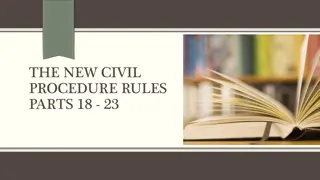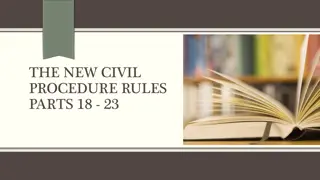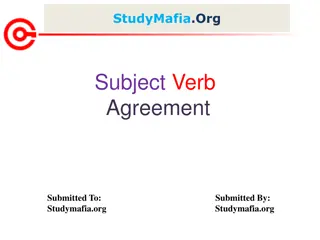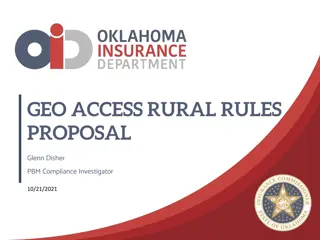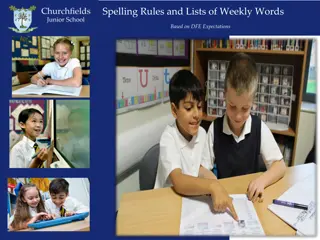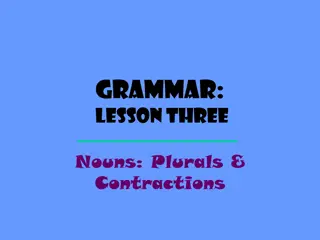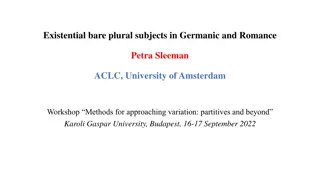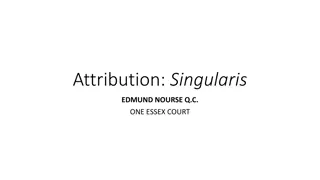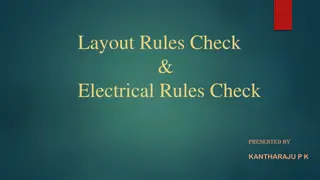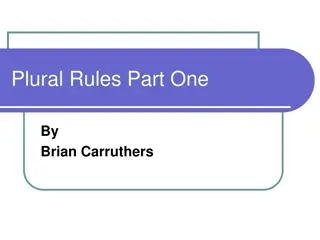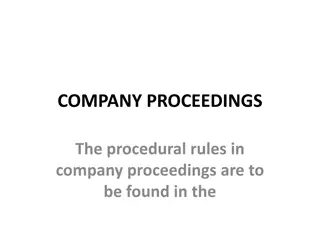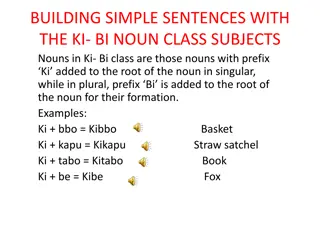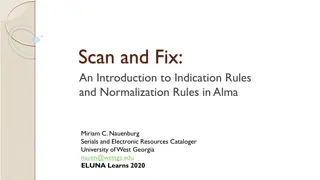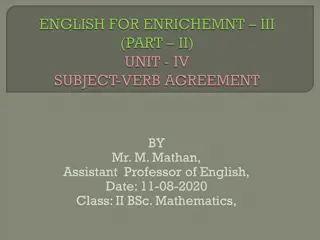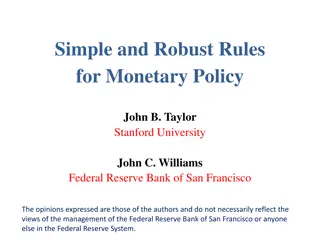Understanding Subject-Verb Agreement in English Sentences
Learn about subject-verb agreement in English sentences with singular and plural nouns, first, second, and third person examples, uncountable nouns, and exceptions where plural nouns take singular verbs. Discover how to match the verb form to the subject noun in different scenarios to ensure grammat
2 views • 17 slides
Understanding Civil Procedure Rules Parts 18-23
The new civil procedure rules cover various aspects such as counterclaims, additional claims, changes to parties, representative parties, miscellaneous rules, and rules regarding minors and patients. The overriding objective is to ensure cases are dealt with justly and at a proportionate cost, consi
1 views • 49 slides
Demonstrative Pronouns: This, These, That, Those - Examples and Exercises
Learn about demonstrative pronouns "this," "these," "that," and "those" with examples and exercises for both singular and plural nouns. Explore how to correctly use these pronouns in sentences and strengthen your understanding through interactive questions. Practice identifying and differentiating b
1 views • 17 slides
Motorboat Training, testing, and licensing: Rules of the Road & Aids to Navigation Manual
This presentation covers essential information on motorboat training, testing, and licensing, focusing on rules of the road and aids to navigation. It includes details on navigation rules, the importance of following them to prevent accidents, and where the rules apply. The content also explains who
0 views • 34 slides
Learn Plural and Singular Forms with Animals in English
This lesson focuses on differentiating between plural and singular forms using animals as examples. Students will learn to write sentences using "They're" for plural and "It's a" for singular, while looking at pictures of various animals. By the end of the lesson, students will be confident in using
1 views • 6 slides
Understanding the New Civil Procedure Rules Parts 18-23
The new civil procedure rules cover various aspects like counterclaims, addition of parties, changes to case statements, representative parties, miscellaneous rules about parties, and rules regarding minors and patients. The overriding objective is to ensure cases are dealt with justly and at a prop
3 views • 49 slides
Guidelines for Forming Singular and Plural Nouns
This collection provides clear guidelines for forming singular and plural nouns, including adding "-s", "-y endings, and "-ies". It also covers exceptions, proper nouns, and tips on pluralizing certain words. Learn when to add "-es", double consonants, or when a false pronunciation might occur.
0 views • 21 slides
Mastering Subject-Verb Agreement: Essential Grammar Rules for Class 10 English
Explore the fundamentals of subject-verb agreement in English grammar with Assistant Teacher Abul Kashem Miah. Learn the rules, examples, and practical applications for both singular and plural subjects. Enhance your understanding through comprehensive lessons and exercises. By the end of this class
1 views • 17 slides
Noun Declensions in Latin - Rules and Examples
Explore the declensions of nouns in Latin for the second declension, including masculine and neuter genders. Learn about the endings for singular and plural forms, along with specific rules for each gender. Dive into the differences between masculine and neuter noun declensions with detailed explana
0 views • 7 slides
Understanding Subject-Verb Agreement in Grammar
Subjects and verbs must agree in number to ensure grammatical accuracy. Singular subjects require singular verbs, while plural subjects demand plural verbs. Various rules and examples illustrate how prepositional phrases, word order, and questions can impact subject-verb agreement.
0 views • 28 slides
Financial and Eligibility Rules for EU Cooperation Programmes
Financial and eligibility rules for EU cooperation programmes include details on the first-level control unit, sources of information, hierarchy of rules, overarching eligibility rules, and reporting overview. These rules cover areas such as project activities, expenditure eligibility, procurement r
2 views • 27 slides
Understanding Singular and Plural Nouns
Learn the rules of singular and plural nouns, including regular and irregular forms. Discover how to form plurals with examples like adding -s, -es, -ies, or -es to words ending in specific letters like -s, -x, -z, -ch, -sh. Enhance your grammar skills with this comprehensive guide.
0 views • 10 slides
All About Nouns: Types, Rules, and Examples
Explore the world of nouns - words that name people, places, things, or ideas. Learn about singular/plural, common/proper, concrete/abstract nouns, possessive/collective nouns, and rules for making singular nouns plural with helpful examples.
1 views • 22 slides
Rural Access Compliance Rules Proposal by Glenn Disher - PBM Investigator
Proposal by Glenn Disher, a PBM Compliance Investigator, outlines rules for rural access compliance. The proposal focuses on considering local conditions and enforcing rules for maximum impact. It includes recommendations for zip code rules, compliance mileage rules, and examples of non-compliant ru
0 views • 7 slides
Understanding Subject-Verb Agreement in English Grammar
In this multimedia class session, Assistant Head-teacher Uttam Adhikary introduces the concept of subject-verb agreement, emphasizing the importance of matching singular subjects with singular verbs and plural subjects with plural verbs. Through engaging examples and presentations, students will lea
0 views • 41 slides
Spelling Rules and Lists for Year 3 and Year 4 Autumn Terms
Explore spelling rules and lists for Year 3 and Year 4 Autumn Terms. Covering topics such as double letters, silent letters, the 'ate' sound, plural nouns, and more. The resources provide guidance on common spellings and words to enhance spelling skills in line with DFE expectations.
0 views • 25 slides
Understanding Plural Nouns in English Grammar
Exploring the rules for forming plural nouns in English, from adding "s" to special cases like words ending in "s," "ch," "sh," "x," or "z." Learn how to modify nouns ending in vowels or consonants, as well as irregular plural forms and compound words. Enhance your grasp of English grammar with prac
0 views • 16 slides
Understanding Singular and Plural Nouns
Singular and plural nouns can sometimes be confusing, but this guide clears up common misconceptions. Learn when to use plural nouns for singular items, how certain nouns can be singular or plural, and when to use singular or plural verbs with specific nouns like sports teams or companies. Recognize
0 views • 9 slides
A Guide to Subject-Verb Agreement Basics
Understand the essentials of subject-verb agreement in sentences. Learn how singular subjects match singular verbs and plural subjects pair with plural verbs. Discover key rules, including handling words between the subject and verb, dealing with prepositional phrases, and recognizing subject placem
0 views • 7 slides
Existential Bare Plural Subjects in Germanic and Romance Languages
Workshop explores the variation in using existential bare plural subjects in English, Dutch, Spanish, Italian, and other languages, presenting different linguistic analyses and theories regarding their occurrence across Germanic and Romance language families.
0 views • 49 slides
Understanding Subject-Verb Agreement
Master the rules of subject-verb agreement for singular and plural subjects, irregular verbs like be, have, and do, and compound subjects. Learn how to match singular subjects with singular verbs and plural subjects with plural verbs, and understand verb forms for different scenarios. Explore exampl
0 views • 40 slides
Understanding Singular and Plural Indefinite Pronouns
Explore the difference between singular and plural indefinite pronouns with examples. Learn about singular indefinite pronouns like 'each' and 'nobody', plural ones such as 'several' and 'few', and those that can be both singular and plural like 'some' and 'all'.
0 views • 5 slides
Understanding Singular, Plural, and Possessive Nouns
Explore the basics of singular, plural, and possessive nouns with examples and guidelines on forming and using them correctly. Enhance your writing skills and grasp the concept of noun variations effortlessly.
0 views • 13 slides
Understanding Company Attribution Rules in Legal Proceedings
Company attribution rules in legal proceedings are outlined, focusing on primary rules found in a company's constitution, general principles of agency, and exceptions where traditional attribution methods may not apply. The interpretation of laws involving companies and the application of specific a
0 views • 7 slides
Understanding Broken Plural in Arabic Grammar
Explore the concept of Broken Plural in Arabic grammar through this detailed content covering sound plural forms, patterns, and examples like Children, Geese, Teeth, Boys, Girls, Students. Gain insights into 3rd person female singular nouns, pronouns, pointers, and verbs in Broken Plural form. Disco
0 views • 21 slides
Understanding Compound Subjects in Grammar
Compound subjects joined by "and" usually require plural verbs, while compound subjects joined by "or," "nor," "either or," or "neither nor" may be singular or plural depending on the subject closest to the verb. Recognizing when to use singular or plural verbs with compound subjects is essential fo
0 views • 5 slides
Layout and Electrical Rules Check by KANTHARAJU P.K.
Layout rules check is essential in preparing masks for fabrication processes to ensure accuracy. Key design rules include minimum width, spacing, enclosure, and extension. Electrical rules checking (ERC) methodology is used to verify design robustness against electronic design rules at schematic and
0 views • 15 slides
Mastering Plural Rules: Practical Tips for Crafting Plurals Easily
Enhance your knowledge of plural rules through a comprehensive guide by Brian Carruthers. Explore strategies for forming plurals using common suffixes and exceptions, accompanied by engaging examples. Boost your grammar skills effortlessly with this resource.
0 views • 19 slides
Grammar Rules Guide: Capitalization, Possessives, and Plurals
Learn the rules of capitalization, possessives, and forming plurals in English grammar. Understand when to capitalize titles, direct addresses, and regions. Discover how to form possessives for singular, plural, and irregular nouns. Get insights on creating plural forms, especially for compound word
0 views • 10 slides
Understanding Plural and Possessive Forms in English
Learn the distinction between plural (-s) and possessive (-'s) forms in English nouns through examples and explanations. Discover how to form plurals, show possession, and distinguish between plural and possessive usage in sentences.
0 views • 8 slides
Understanding Procedural Rules in Company Proceedings
Procedural rules governing company proceedings can be found in the Companies Proceeding Rules, Companies Winding-Up Rules, and the Federal High Court (Civil Procedure) Rules. These rules dictate the process for applications, such as Originating Summons, Originating Motion, or Petition under CAMA. Th
0 views • 22 slides
Constructing Sentences with Ki-Bi Noun Class
Learn how to form simple sentences using nouns in the Ki-Bi class. Discover how to create plural nouns and construct subject-predicate sentences with the appropriate prefixes. Explore examples and rules for transforming singular nouns into plural forms. Master the use of Ki and Bi prefixes for effec
0 views • 5 slides
Understanding Subject-Verb Agreement in Grammar
Explore the importance of subject-verb agreement in sentences, where a singular subject requires a singular verb and a plural subject needs a plural verb. Learn how to match subjects and verbs correctly to maintain agreement. Discover tips, examples, and resources to enhance your grammar skills effe
0 views • 73 slides
Scan and Fix: Indication and Normalization Rules in Alma
Introduction to indication rules and normalization rules in Alma Miriam C. Nauenburg's presentation on the scan and fix workflow. Learn about creating and applying indication and normalization rules, testing rules in the Metadata Editor, and organizing rules as private or shared.
0 views • 54 slides
Understanding Subject-Verb Agreement in Grammar
Learn about subject-verb agreement with singular and plural nouns, including examples and explanations. Explore how collective nouns impact verb usage, whether they are treated as singular or plural. Practice exercises provided for better understanding.
0 views • 15 slides
Understanding Singular and Plural Numbers in English Grammar
Explore the concept of singular and plural numbers in English grammar. Learn about the rules for converting singular nouns to plural, including adding "-s" and "-es" as suffixes. Discover exceptions to the rules and when to use them. Enhance your knowledge of English grammar with practical examples
0 views • 27 slides
Subject-Verb Agreement Rules in English Grammar
Learn essential rules of subject-verb agreement in English grammar with examples. Understand when to use singular or plural verbs based on different subject types and connections. Improve your sentence structure and communication skills.
0 views • 13 slides
Simple and Robust Rules for Monetary Policy Overview
This document discusses the historical background, empirical experience, characteristics of simple rules, robustness, and the comparison between optimal control and simple rules in monetary policy. It explores the evolution of policy rules from Smith and Ricardo to modern approaches, emphasizing the
0 views • 22 slides
PA Dutch 101 - Command Forms
PA Dutch 101 Video 37 covers Command Forms in Pennsylvania Dutch. There are three command forms: Singular, Plural, and Lets. The choice of form depends on the number of people being addressed. The Singular Form is used for one person, the Plural Form for multiple people, and the Lets Form when sugge
0 views • 8 slides
English Grammar Rules Using Both And, Not Only But Also, Either Or, Neither Nor
Learn the grammar rules involving using both and, not only but also, either or, neither nor with examples and explanations. Understand the usage of plural and singular verbs, past, present, and future tenses, and the use of do, does, has, have in sentences. Enhance your English language skills throu
0 views • 8 slides

